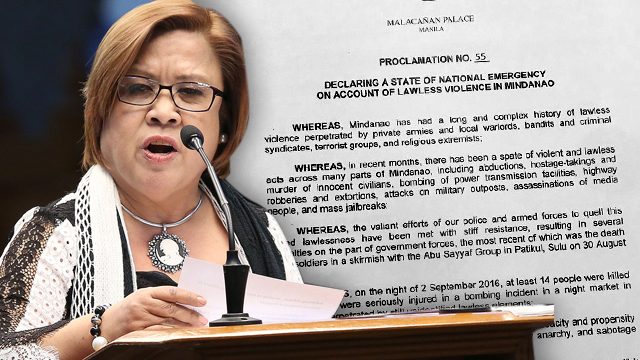SUMMARY
This is AI generated summarization, which may have errors. For context, always refer to the full article.

MANILA, Philippines – Two of the guidelines released by Malacañang on the implementation of the state of national emergency declared by President Rodrigo Duterte are “prone to abuses,” the chair of the Senate committee on justice and human rights said on Thursday, September 8.
Neophyte Senator Leila De Lima said that the provisions allowing warrantless arrests if a person waives his right and warrantless searches during emergency circumstances are “problematic.” (READ: State of nat’l emergency: More police, military in malls, train stations)
Under the law, and as also espoused in the Palace guidelines, warrantless arrests are allowed when:
- The person to be arrested has committed, is actually committing, or is attempting to commit an offense in the presence of the arresting officer
- An offense has just been committed and the arresting officer has personal knowledge of facts indicating that the person to be arrested has committed the offense
- The person to be arrested is a prisoner who has escaped from a penal establishment or place where he or she is serving final judgment or temporarily confined while the case is pending
The “problematic” part, De Lima said, is the additional line allowing warrantless arrest “when the person arrested, or to be arrested, has voluntarily waived his right” against it.
For the former justice chief and chairperson of the Commission on Human Rights, voluntary surrender happens when there is already a warrant of arrest – contradictory to the guidelines released by the Palace.
“My point here is there may be some legal rationale for this and may be referred to this concept of voluntary surrender pero iba pong kontekso ang voluntary surrender na alam ko. Kung ‘di nila malinawan o ilinaw ito (but the voluntary surrender that I know of has a different context. If they won’t clarify this or make this clearer), I’m afraid this is going to be prone to abuse,” De Lima told reporters.
“Pagkakaalam ko po, ‘pag sinabing voluntary surrender, karamihan ng kaso ay ‘pag meron nang warrant of arrest. Iba namang usapin ‘yung warrantless arrest,” she added.
(As far as I know, if you say voluntary surrender, in most cases there is already a warrant of arrest. Warrantless arrest is a different matter.)
She then questioned how to truly know if those who waived their rights had indeed done so voluntarily. De Lima said it is easy for authorities to “force” suspects to give up their rights.
“Paano natin malalaman kung ‘yung taong inaaresto na hindi naman covered doon sa 3 recognized instances of warrantless arrest ay tunay na nagwaive? Siyempre ‘pag inaaresto ka na, papalag ka pa ba?” De Lima said.
(How would we know if the arrested person who is not covered by the 3 recognized instances of warrantless arrest indeed truly waived his rights? Of course when you are arrested, can you still refuse it?)
De Lima maintained that a suspect could not waive his or her own rights without fully knowing well what he or she is getting into, and without the presence of a lawyer.
Define ‘exigent, emergency’ cases
On warrantless searches, De Lima urged Malacañang to define what constitutes “exigent and emergency” circumstances.
Questioning the addition of the last line, De Lima said the law only allows 6 conditions in implementing warrantless searches and seizures, which are also contained in the Palace list:
- When the person to be searched has consented to the search or has voluntarily waived his right against warrantless searches and seizures
- As an incident to a lawful arrest, and the search is made contemporaneous to the arrest and within a permissible area of search
- Search of vessels and aircraft for violation of immigration and customs laws
- Search of automobiles at borders or “constructive” borders for violation of immigration or smuggling laws
- Where the objects and effects to be seized are in plain view
- Stop-and-frisk situations
“‘Yung first 6, ‘yan naman talaga ang recognized instances of warrantless searches and seizures pero ‘yung search arising from exigent and emergency circumstance, mukhang bago na naman ito. Sino magde-define? I think they should first define exigent and emergency circumstance as it is prone to abuse,” she said.
(The first 6, those are really the recognized instances of warrantless searches and seizures but the search arising from exigent and emergency circumstance, that’s something new. Who will define it? I think they should first define exigent and emergency circumstance as it is prone to abuse.)
Case before the SC?
With all these concerns, the senator – deemed the fiercest critic of the President – said she is expecting that the declaration would be questioned before the Supreme Court.
While saying she has no personal knowledge on any planned attempts, the senator said she would not be “surprised” if there are human rights advocates who would file a case against it.
“I’m not personally aware but I won’t be surprised kung meron na hong mag-question, lalo mga human rights advocates,” she said.
(I’m not personally aware of any plans to file a case but I won’t be surprised if some will question the declaration, especially human rights advocates.)
De Lima, however, said the SC may still uphold the declaration if only based on its prior decision to uphold President Gloria Macapagal-Arroyo’s declaration of a state of emergency in Maguindanao and Sultan Kudarat provinces, and in Cotabato City, after the 2009 Maguindanao massacre.
The Court had also upheld Presidential Proclamation 1017, Arroyo’s declaration of a state of national emergency in 2006, following a coup attempt against her. – Rappler.com
Add a comment
How does this make you feel?
There are no comments yet. Add your comment to start the conversation.